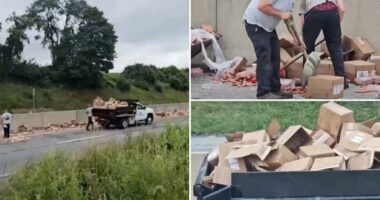And while some funding help has been announced, she urged leaders to talk to farmers to see how they can better help.

”We just need people to understand that it’s happening,” she told 9news.com.au.
“There’s never been a drought like this in South Australia.
“We’ve never, ever experienced this.
“It’s never gone on for this long.”
She says they have just had to make the tough choice to sell 1000 ewes, which will have an impact lasting for years.
For example, it means far fewer lambs to sell next year, after what has already been a tough few years with falling livestock prices.
Even if it rains soon, the soil will be in no fit state to plant crops.
“To come off the back of that bad year for livestock prices and straight into a year of drought and into another one, there’s only so many emergency funds you can draw on,” she said.
“One farmer put it so well. He said, ‘To work for an entire year the same amount of hours that I did the year before, to be behind, is heartbreaking.'”
The Bureau of Meteorology confirmed that since 2021, parts of agricultural regions of South Australia have seen record low rainfall compared with records as far back as 1900.
A $55 million package was announced last month by the SA government, on top of $14 million from November 2024.
Oster said while they were able to get some grants, they need leaders to understand what they are facing and allow more farmers to get more help.
“Why don’t you just talk to us? Have a bit more community feedback and consultation,” she said.
“We are the best ones to say, ‘This would help, that would help’.”
The National Drought Agreement (NDA) says it instead aims to offer help based on need instead, rather than declaring droughts as happened in the past.


Wade Boughen, who runs family sheep farm Kamora Park Poll Merinos, two hours east of Adelaide, started the petition and just wants more help.
“The amount of money they’ve issued doesn’t really cover too much, we haven’t got anything in relief,” he told 9news.com.au.
“Without timely intervention, we risk irreversible damage.”
South Australian Liberal MP Nicola Centofanti, the opposition primary industries spokeswoman, said the relief package has “missed the mark”.
Last week, she read a letter from a farmer in state parliament, in which a farmer said a farming friend had taken his own life over the stress of the drought.
”There is too much red tape, too much time required to access help and lengthy waiting times for outcomes,” she said.
Clare Scriven, South Australian minister for primary industries and regional development, said in a statement the $73 million drought support package has been “designed in consultation with primary producers, farmers and key industries bodies”.
“I want to get the message out; drought declarations don’t happen,” she said.
“There is an absolute need for people to reach out now because assistance is available.”






